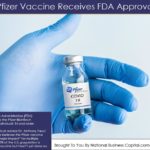On Monday, the U.S. Food and Drug Administration (FDA) granted full approval to the Pfizer–BioNTech Covid-19 vaccine for individuals 16 and older. It’s the first coronavirus vaccine to receive full FDA approval, and many believe it will lead to additional vaccine mandates across the U.S.
The FDA’s press release stated that going forward, the Pfizer vaccine will be marketed as Comirnaty. Acting FDA Commissioner Janet Woodcock, M.D. said, “Today’s milestone puts us one step closer to altering the course of this pandemic in the U.S.”

How emergency use authorization works
The Pfizer vaccine has been available for emergency use for individuals ages 16 and older since December 2020. In May, the emergency use authorization was extended to children ages 12 and older. An emergency use authorization (EUA) grants a medical product special authorization during a health emergency. The Moderna and Johnson and Johnson vaccines are also available for emergency use, and Moderna has started applying for full approval. Many people see full FDA approval as an essential step to overcoming vaccine hesitancy among Americans. Just over 50% of Americans are fully vaccinated, and more than 92 million took the Pfizer vaccine. Officials hope that the FDA’s approval will encourage more Americans to get vaccinated. “While millions of people have already safely received COVID-19 vaccines, we recognize that for some, the FDA approval of a vaccine may now instill additional confidence to get vaccinated,” Woodcock added.Will FDA approval lead to additional vaccine mandates?
White House chief medical advisor Dr. Anthony Fauci spoke to NPR, saying he believes the Pfizer vaccine approval will have a “major impact” for multiple reasons. First, roughly 20% of the U.S. population is eligible to receive the vaccine but hasn’t yet done so. He believes the FDA approval could encourage many of these Americans to get vaccinated. According to a Kaiser Family Foundation survey, 30% of unvaccinated adults said they would be more likely to get vaccinated if it had full FDA approval. But in addition, Dr. Fauci said that the FDA’s approval would likely encourage more companies and organizations to pass vaccine mandates. And early signs indicated that he could be right. Within hours of the FDA’s announcement, the Pentagon, New York City school system, and CVS announced new vaccine mandates. President Biden also urged companies in the private sector to “step up” and issue COVID-19 vaccine mandates.How employers can combat vaccine hesitancy
Health experts agree that a successful vaccination program is key to ending the pandemic and achieving herd immunity. And whether or not employers issue vaccine mandates, they can still play an important role in encouraging all employees to get vaccinated. Here are proactive steps employers can take to combat vaccine hesitancy:- Educate employees: Companies can educate their employees about the benefits of the COVID-19 vaccines. Employers should focus on the facts, like how the Pfizer, Moderna, and Johnson and Johnson vaccines have all shown to decrease hospitalization rates by more than 99%.
- Provide positive rewards: For employers that don’t want to issue mandates, using rewards to encourage employees to get vaccinated can be an effective strategy. Some companies have offered gift cards and paid time off to employees that get vaccinated.


